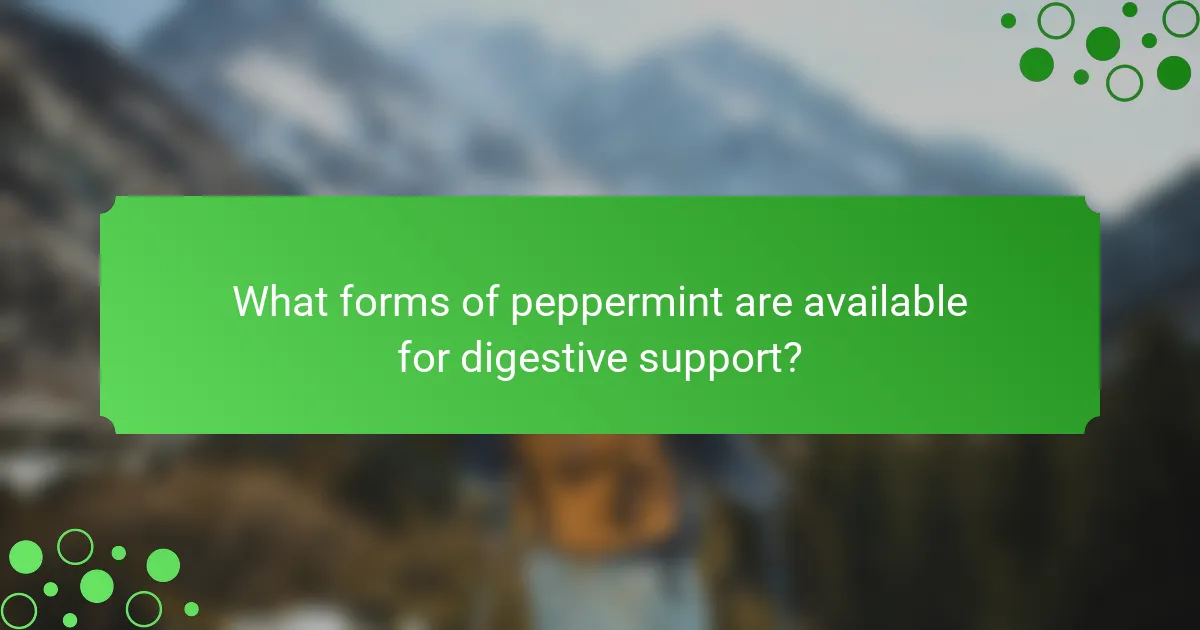Peppermint is known for its digestive aid properties, helping to relax the gastrointestinal tract and reduce bloating. This article explores the benefits of peppermint for digestive health, its various forms of intake such as tea and capsules, and expert tips for effective use. Additionally, it highlights precautions to consider when incorporating peppermint into your routine.

What are the digestive aid properties of peppermint?
Peppermint aids digestion by relaxing the gastrointestinal tract, reducing bloating, and alleviating discomfort. Its active compounds, such as menthol, enhance digestive enzyme activity. Peppermint tea is a popular form of intake, while peppermint oil can be used in capsules or aromatherapy. Studies show that peppermint oil reduces symptoms of irritable bowel syndrome in many patients.
How does peppermint affect digestion?
Peppermint aids digestion by relaxing the muscles of the gastrointestinal tract, which alleviates symptoms like bloating and gas. Its benefits include improved bile flow and relief from indigestion. Common forms of intake are peppermint tea, essential oil, and capsules. Each form retains the herb’s active compounds, such as menthol, which enhance digestive comfort.
Which compounds in peppermint contribute to its digestive benefits?
Peppermint contains several compounds that enhance its digestive benefits, primarily menthol, menthone, and rosmarinic acid. Menthol relaxes the muscles of the gastrointestinal tract, alleviating symptoms like bloating and gas. Menthone aids in stimulating bile production, which is essential for fat digestion. Rosmarinic acid possesses anti-inflammatory properties that can soothe digestive discomfort.

What are the health benefits of using peppermint for digestion?
Peppermint aids digestion by relaxing the muscles of the gastrointestinal tract, reducing bloating, and alleviating gas. Its primary benefits include easing indigestion, relieving symptoms of irritable bowel syndrome, and promoting bile flow. Peppermint can be consumed in various forms, such as tea, essential oil, capsules, or fresh leaves. Each method offers unique advantages, with tea being soothing and capsules providing concentrated doses.
How does peppermint alleviate symptoms of indigestion?
Peppermint effectively alleviates symptoms of indigestion by relaxing the muscles of the gastrointestinal tract. This relaxation helps reduce bloating, gas, and discomfort. The menthol in peppermint acts as a natural antispasmodic, easing cramping and promoting smoother digestion.
Peppermint can be consumed in various forms, including tea, oil, capsules, and fresh leaves. Each method provides distinct benefits, with tea offering soothing warmth, while essential oil can be used for topical relief. Studies indicate that peppermint oil capsules can significantly reduce symptoms of irritable bowel syndrome, highlighting its therapeutic potential.
In addition to its digestive benefits, peppermint has a refreshing aroma that can enhance overall well-being. The unique attribute of peppermint is its ability to stimulate bile production, further aiding digestion. Regular intake may lead to improved digestive health over time.
Why is peppermint effective for bloating and gas relief?
Peppermint effectively alleviates bloating and gas due to its antispasmodic properties. It relaxes the muscles of the gastrointestinal tract, allowing gas to pass and reducing discomfort. The menthol in peppermint enhances digestive processes, promoting faster relief.
Peppermint can be consumed in various forms, including tea, capsules, and essential oil. Each method offers unique benefits, with tea providing a soothing experience and capsules offering concentrated doses. Essential oil can be used in aromatherapy to ease digestive distress.
Research indicates that peppermint oil can significantly improve symptoms of irritable bowel syndrome, which often includes bloating and gas. This makes it a valuable natural remedy for digestive issues.
In summary, peppermint’s effectiveness for bloating and gas relief stems from its muscle-relaxing properties, various intake forms, and supportive research findings.
What role does peppermint play in reducing nausea?
Peppermint effectively reduces nausea due to its natural compounds that soothe the digestive system. The menthol in peppermint relaxes the muscles in the gastrointestinal tract, alleviating discomfort. Additionally, peppermint oil can be ingested or inhaled to maximize its anti-nausea effects. Research indicates that peppermint is particularly beneficial for those experiencing motion sickness or nausea related to pregnancy.

What forms of peppermint are available for digestive support?
Peppermint is available for digestive support in several forms, including tea, capsules, oil, and extracts. Each form offers unique benefits and methods of intake.
Peppermint tea provides a soothing beverage option that can ease digestive discomfort. Capsules offer a convenient way to consume concentrated peppermint oil without the taste. Peppermint oil is often used in aromatherapy and can be diluted for topical application. Extracts can be added to food or drinks for digestive relief.
Each form varies in potency and method of delivery, making it essential to choose based on individual preferences and needs.
Which types of peppermint tea are best for digestion?
Peppermint tea varieties that aid digestion include traditional peppermint, spearmint, and peppermint blends. Traditional peppermint tea is known for its strong menthol flavor and soothing properties, making it effective for alleviating digestive discomfort. Spearmint tea is milder and can help with nausea and bloating. Blends that incorporate peppermint with ginger or chamomile enhance digestive benefits by providing additional soothing effects. Each type can be consumed as a hot infusion or cold brew, offering versatility in intake.
How do peppermint oil capsules compare to other forms?
Peppermint oil capsules offer a convenient and concentrated form of intake compared to other methods. They provide digestive benefits similar to peppermint tea and essential oil, but with a more controlled dosage. Capsules are less likely to cause heartburn than oil, making them a preferred choice for sensitive individuals. In contrast, peppermint tea offers a milder effect and is easier to prepare. Essential oil can be potent but requires careful dilution. Each form has unique attributes that cater to different preferences and needs.
What are the advantages of using fresh peppermint leaves?
Fresh peppermint leaves provide numerous advantages, particularly as a digestive aid. They help alleviate symptoms of indigestion, bloating, and gas. The menthol in peppermint stimulates bile production, enhancing fat digestion. Additionally, peppermint can soothe the gastrointestinal tract, reducing discomfort. Common forms of intake include teas, essential oils, and culinary uses in salads or desserts.

How can peppermint be incorporated into daily routines for digestive health?
Peppermint can be easily incorporated into daily routines to support digestive health through various methods. Drinking peppermint tea after meals can alleviate bloating and discomfort. Adding fresh peppermint leaves to salads or smoothies enhances flavor and provides digestive benefits. Peppermint oil capsules are another effective form of intake, offering concentrated relief. Lastly, using peppermint essential oil in aromatherapy may help reduce feelings of nausea.
What are some easy recipes using peppermint for digestive aid?
Peppermint can be easily incorporated into recipes for digestive aid. Here are some simple options:
1. Peppermint tea: Steep fresh peppermint leaves in hot water for 5-10 minutes. Enjoy to relieve bloating.
2. Peppermint-infused yogurt: Mix chopped peppermint leaves into plain yogurt for a refreshing digestive boost.
3. Peppermint smoothie: Blend peppermint leaves with banana, spinach, and coconut water for a nutritious drink.
4. Peppermint salad dressing: Whisk olive oil, vinegar, and minced peppermint for a zesty salad dressing.
5. Peppermint lemonade: Combine fresh lemon juice, water, and peppermint leaves for a soothing beverage.
These recipes leverage peppermint’s unique attribute of aiding digestion while providing refreshing flavors.
Which beverages can be enhanced with peppermint for digestive benefits?
Peppermint can enhance various beverages, providing digestive benefits. Popular choices include herbal teas, water, smoothies, and cocktails. Herbal teas infused with peppermint can soothe the stomach and reduce bloating. Adding peppermint to water enhances flavor while aiding digestion. Smoothies benefit from peppermint’s refreshing taste and digestive properties. Cocktails infused with peppermint create a unique flavor profile while supporting digestive health.
How often should peppermint be consumed for optimal results?
Peppermint can be consumed daily for optimal digestive benefits. Regular intake helps alleviate symptoms like bloating and indigestion. The recommended forms include peppermint tea, capsules, or essential oil in moderation. Consuming 1-2 cups of tea or 1-2 capsules per day is effective.

What precautions should be taken when using peppermint for digestion?
When using peppermint for digestion, it is important to take certain precautions. First, consult a healthcare professional before starting any new herbal remedy, especially if you have existing health conditions or are pregnant. Second, use peppermint in moderation to avoid potential side effects like heartburn or allergic reactions. Third, consider the form of intake, as peppermint oil is more concentrated than tea or leaves, which may require different dosages. Lastly, be aware of any interactions with medications, particularly those related to gastrointestinal issues.
Are there any side effects associated with peppermint use?
Peppermint use can cause side effects such as heartburn, allergic reactions, and gastrointestinal issues. Some individuals may experience nausea or vomiting. These effects are generally rare and often depend on the form of intake and dosage. Always consult a healthcare professional if uncertain about peppermint’s suitability for you.
Which individuals should avoid peppermint?
Individuals with specific health conditions should avoid peppermint. This includes those with gastroesophageal reflux disease (GERD), as peppermint can exacerbate symptoms. Pregnant women should also limit intake due to potential uterine stimulation. Additionally, individuals with allergies to mint or those taking certain medications, such as antacids, should exercise caution.

What expert tips can enhance the effectiveness of peppermint as a digestive aid?
To enhance the effectiveness of peppermint as a digestive aid, consider these expert tips. Use peppermint oil capsules for targeted relief, as they can help reduce symptoms of irritable bowel syndrome. Drinking peppermint tea after meals can also aid digestion and alleviate bloating. Additionally, combining peppermint with ginger may provide synergistic benefits for digestive health. Always consult a healthcare professional before starting any new supplement regimen to ensure safety and efficacy.